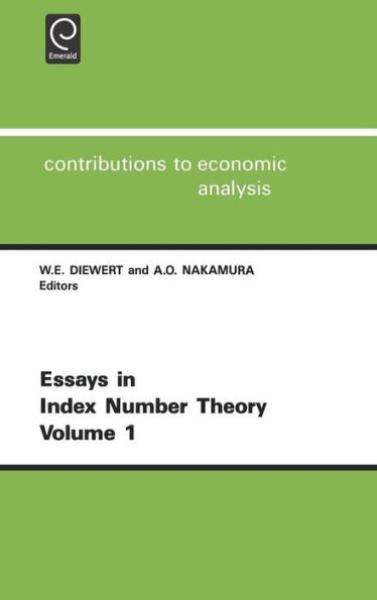Description
This volume and a subsequent one, contain several new papers on index number and aggregation theory, as well as some previously published papers, by W.E. Diewert and co-authors. The two volumes study aggregation problems in economics, primarily the aggregation over goods problem. However, some of the chapters also touch on aspects of the aggregation over agents problem. In the present volume, the reader can find, according to his/her requirements, either a short course on index number theory; a more in-depth course; or chapters on specific topics such as the measurement of inequality, functional forms for social welfare functions, or the theory of choice under uncertainty. Students and researchers will appreciate having these papers easily accessible. The book will be valuable too for those in the government agencies around the world that produce price statistics, insuring an understanding of important properties of alternative indexes, and of how economists use and interpret price indexes.
Containing papers on index number and aggregation theory, this volume studies aggregation problems in economics, primarily the aggregation over goods problem. It is useful for government agencies around the world that produce price statistics, insuring an understanding of important properties of alternative indexes.
R.A. Pollak, University of Washington and University of Pennsylvania
The papers in this volume provide a lucid synthesis of the history and the current state of index number and aggregation theory by a leading theorist.
A.S. Deaton, Princeton University
...provides a comprehensive encyclopaedia of the economics of index numbers by the master of the subject, ...an indispensable source and guide book for all those interested in this fascinating subject.
P.A. Samuelson in Foundations of Economic Analysis about chapter 8
Thirty-five years after...there has been but one major advance of index number theory namely W.E. Diewert's formalizing concept of a "superlative index number."
J.E. Triplett, U.S. Bureau of Economic Analysis
These clearly written and carefullly worked out papers will raise the level of professional discourse on the empirical data that economists use in the practice of their profession. Diewert is perhaps the foremost contributor to measurement economics of the past two decades.
Containing papers on index number and aggregation theory, this volume studies aggregation problems in economics, primarily the aggregation over goods problem. It is useful for government agencies around the world that produce price statistics, insuring an understanding of important properties of alternative indexes.
R.A. Pollak, University of Washington and University of Pennsylvania
The papers in this volume provide a lucid synthesis of the history and the current state of index number and aggregation theory by a leading theorist.
A.S. Deaton, Princeton University
...provides a comprehensive encyclopaedia of the economics of index numbers by the master of the subject, ...an indispensable source and guide book for all those interested in this fascinating subject.
P.A. Samuelson in Foundations of Economic Analysis about chapter 8
Thirty-five years after...there has been but one major advance of index number theory namely W.E. Diewert's formalizing concept of a "superlative index number."
J.E. Triplett, U.S. Bureau of Economic Analysis
These clearly written and carefullly worked out papers will raise the level of professional discourse on the empirical data that economists use in the practice of their profession. Diewert is perhaps the foremost contributor to measurement economics of the past two decades.
Last updated on
Product Details
- Emerald Group Publishing Brand
- Mar 17, 1993 Pub Date:
- 0444874712 ISBN-10:
- 9780444874719 ISBN-13:
- 564 Pages
- 9.21 in * 6.14 in * 1.25 in Dimensions:
- 2 lb Weight:




